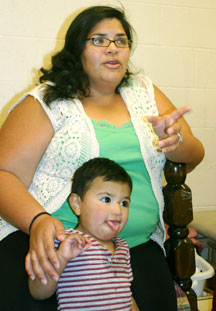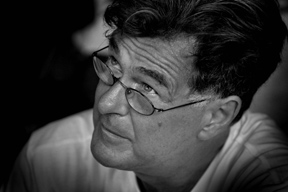Posted: 3/20/08
IRS scrutiny of Obama’s denomination
may signal political-speech crackdown
By Robert Marus
Associated Baptist Press
WASHINGTON (ABP)—What is the IRS thinking?
That’s the question that many church-state experts asked themselves when news broke in late February about the Internal Revenue Service’s investigation of Sen. Barack Obama’s denomination.
By all accounts, this is the first time the IRS has investigated a denomination. The agency is scrutinizing a speech that Obama—an active member of Trinity United Church of Christ in Chicago for more than two decades—gave at a denominational meeting last year.
Officials of the United Church of Christ announced they were under federal investigation for potential violations of tax law. Federal law prevents most churches and other tax-exempt groups organized under Section 501(c)(3) of the tax code from endorsing political candidates or parties.
But, after learning the details about the event, many experts in the area of political activity of churches have wondered why the IRS is investigating a denomination for a potential violation that is, at best, unclear. Some UCC supporters have even gone so far as to suggest the investigation may be politically motivated. The body is generally considered the most liberal major Protestant denomination in the United States.
Several church-state experts said they doubted the IRS would bow to political pressure in a church investigation. But the UCC case and other recent ones suggest the agency is cracking down on potential violations of the law during the 2008 campaign season.
“The one message that is clearest in this election cycle is that the IRS is taking its responsibility more seriously than ever to investigate this (or) any allegations of illegal political activity,” said Barry Lynn, executive director of Americans United for Separation of Church and State. Lynn’s organization frequently files IRS complaints against churches and other religious organizations that appear to violate tax laws by involving themselves in partisan politics.
In a letter, IRS official Marsha Ramirez said “a reasonable belief exists” that the UCC violated the law with the Obama speech.
The agency’s concerns “are based on articles posted on several websites” that described Obama’s appearance at the denomination’s biennial General Synod meeting in Hartford, Conn., last summer, Ramirez continued. The senator—by then an announced Democratic candidate for president—spoke to about 10,000 church members, according to the denomination and news accounts.
But UCC officials said they took pains to ensure the speech was not perceived as a campaign event or an endorsement of the candidate.
Church officials invited Obama as a church member rather than in his capacity as a candidate and asked him to speak a year before he declared his intention to run for higher office, a UCC news release said. Obama was invited “as one of 60 diverse speakers representing the arts, media, academia, science, technology, business and government. Each was asked to reflect on the intersection of their faith and their respective vocations or fields of expertise.”
Prior to the speech, a church official told the crowd the appearance was not intended to be a campaign event and that campaign-related material and other forms of electioneering would not be allowed inside the event venue.
The IRS letter claimed that “40 Obama volunteers staffed campaign tables outside” the Hartford Civic Center, where the event was held. Church officials said they barred any campaigning inside the venue but could not prevent Obama’s campaign workers from setting up on the city street outside.
Obama’s speech, ironically, focused mainly on the proper intersection of faith and politics for Christians. At a few points in the oration, he lapsed into campaign-like language about policies he has advocated in the Senate—or would advocate in the White House—on moral issues such as health care. He also occasionally referred to his candidacy.
But, said a UCC attorney, the denomination shouldn’t be faulted for Obama’s occasional edging into campaign-like rhetoric.
“What the law requires is that the (tax-)exempt organization not engage in political activity,” said Don Clark, a Chicago lawyer who serves as the denomination’s national counsel. “The IRS has interpreted the law … that compliance would require restrictions not only on the behavior of the exempt organization, but on the behavior of the elected official. And so the issue that’s raised here is, if the organization controls its behavior, does everything that it can within its power, but the elected official does something … does the exempt organization, in effect, bear the brunt of the behavior of the elected official?”
The IRS conducts the vast majority of similar investigations into religious groups as responses to complaints filed with the agency’s regional field offices. The complaint that apparently spurred the IRS investigation, posted on a blog critical of the UCC’s leadership ( HYPERLINK "http://www.ucctruths.com" www.ucctruths.com), also mentions a denominational press release prior to the speech noting Obama was a presidential candidate who “has spoken often about his profession of faith, his membership in the socially progressive UCC and the need for Democrats to take seriously the concerns of religious Americans.”
But Lynn—who is an ordained minister in the UCC—said hanging the IRS case on that press release “is a pretty thin reed on which to base a claim that there’s something illegal being plotted when on the other side of the balance is just step after step to avoid this being given the appearance of a campaign appearance.”
Since the 2004 election, the IRS has conducted several prominent investigations of churches and leaders for political activity. In February, Wiley Drake of First Southern Baptist Church of Buena Park, Calif., announced he was under investigation for using church letterhead and a church radio show to endorse Mike Huckabee for the GOP presidential nomination.
Two large churches—one liberal, one conservative—were investigated for sermons delivered from their pulpits just prior to the 2004 presidential election between President Bush and Massachusetts Sen. John Kerry. Each sermon, critics said, while ostensibly about the candidates’ stances on certain moral issues, seemed calculated to recommend one over the other.
In the case of First Baptist Church of Springdale, Ark., the IRS dismissed the complaint Lynn’s organization had filed against it and its pastor, Ronnie Floyd.
But the agency extensively investigated All Saints Episcopal Church in Pasadena, Calif. In that case, the church’s former rector delivered a pre-election sermon that acknowledged both candidates were sincere Christians and that fellow believers could support either one in good conscience. However, the homily went on to denounce Bush’s Iraq war forcefully.
The agency closed the case against the congregation last fall. IRS officials told the church that, although the agency would impose no penalties on All Saints, it still believed the sermon had violated tax law.
All Saints’ legal tab for defending itself ran well into the six-figure range.
After the case closed, the church attempted to find out more about why it had been investigated. Through Freedom of Information Act requests, the congregation discovered coordination between the IRS and the Justice Department on the investigation at a stage that an attorney for All Saints described as “extraordinarily early” for an IRS probe.
“Normally, the Department of Justice becomes involved (in an IRS investigation) when a matter is headed to court,” said Marc Owens, a Washington-based tax attorney who represented the church.
But in All Saints’ case, “the coordination with the DOJ began virtually with the beginning of the examination phase,” Owens continued, referring to the second phase of an IRS inquiry. Judging from the documents they have received, the officials involved in coordinating between the agencies were career civil servants rather than political appointees, he said.
Lynn said such a consultation might have come up so early because of the sensitive legal nature of disputes between the government and churches.
“If I were a bureaucrat (for the IRS) and I found out that somebody was really fighting back and they were in any way discussing their free-speech rights, I’d be on the phone with the Justice Department sooner rather than later,” he said.
Nonetheless, he added, “it did strike me as unusual, but it may be unusual only because other people (under IRS investigation) haven’t filed those (freedom-of-information) requests” to find out more about their investigations.
Both Lynn and Owens said they doubted that such investigations are politically motivated.
“I resist the idea that there’s some kind of a crackdown or politicization of the Internal Revneue Service; I just don’t see any evidence of that,” Lynn said.
The Internal Revenue Service, which usually declines to discuss individual cases, did not respond to requests for comment from Associated Baptist Press. A Justice Department spokesman said his agency had no comment on the All Saints case.
Whatever the motivation for such aggressive investigations, Owens said, there are consequences for the churches under scrutiny.
“The issue there is whether there is some sort of attempt to chill (free) speech. And what we’re talking about is literally speech, and many times religious speech,” he said. “And the alacrity with which the IRS is moving is suggesting some sort of effort to head off further interactions.”
News of religion, faith, missions, Bible study and Christian ministry among Baptist churches, in Texas, the BGCT, the nation and around the world.

